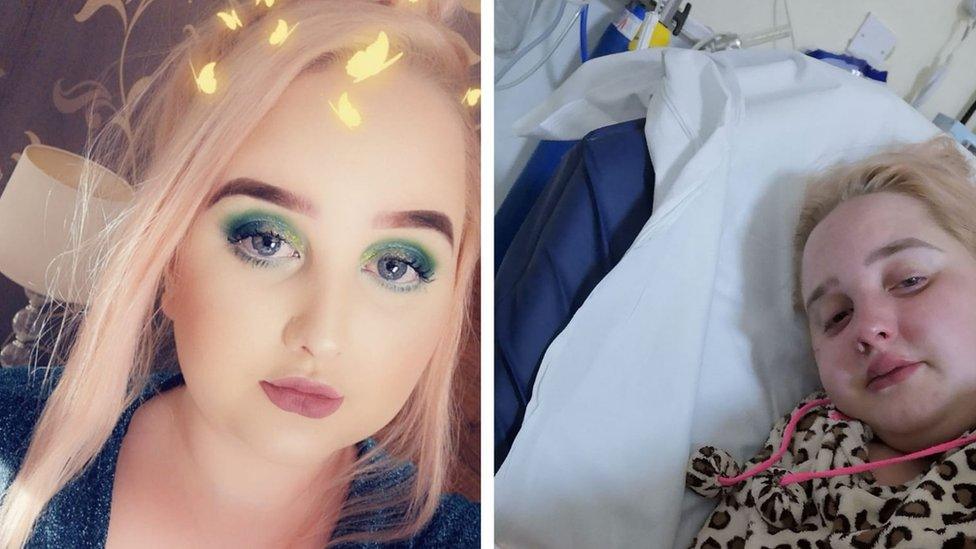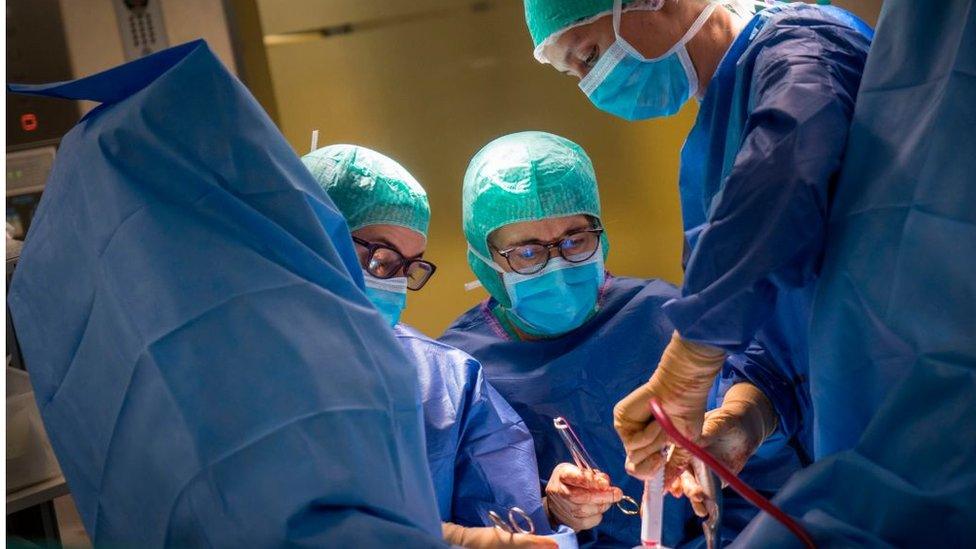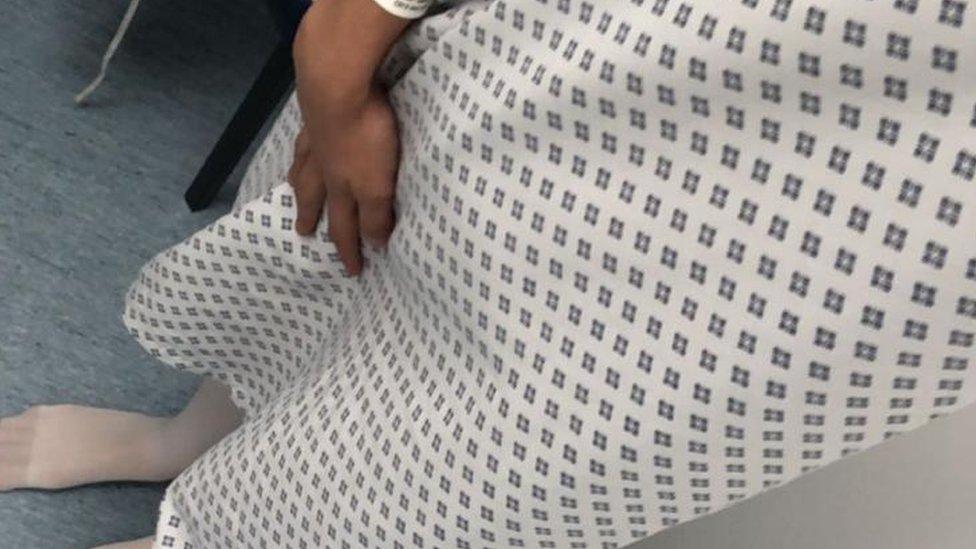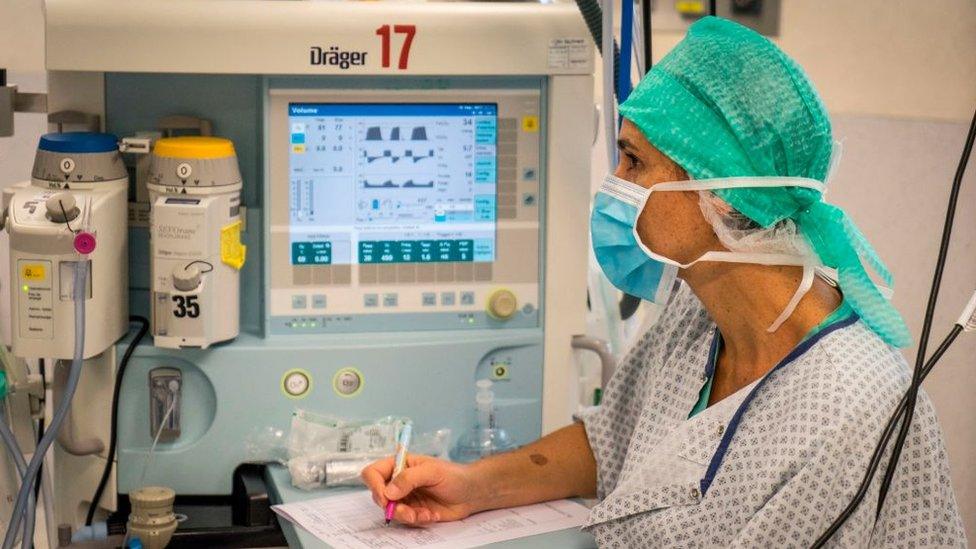'Extreme pain ruined my sex life'
- Published

Hollie shows how she looks with make-up on and in hospital during treatment for her endometriosis
"Sex hurts so I very rarely do it and the pain afterwards, it's just awful."
Hollie is one of 1.5 million women in the UK who have endometriosis, external.
It occurs when tissue similar to the lining of the womb grows in places like the ovaries and fallopian tubes, meaning fertility can be affected.
In her case, as with many others, it can also cause excruciating flare-ups of pain during and after sex.
"It's not just the fact you might not be able to conceive and have kids or the family you want, it also affects your sex life," says Hollie.
She is 24 and her education, career prospects and mental health have all suffered because of how severe her endometriosis is.
Hollie took part in BBC research into the condition along with 13,500 other women in what is the biggest investigation of its kind in the UK.
She was diagnosed with it in March 2018 after having symptoms for five years.
"Having that [the ability to have sex] taken away from you affects your mental health."
Hollie has a daughter with her partner. She says he is really supportive of her and the pain she has to go through, but it doesn't stop her from worrying.

Some women opt for a hysterectomy to try to ease their symptoms
"It makes me feel like I'm a failure and not a good girlfriend," she says, adding that the anxiety she suffers as a result of her condition is "debilitating".
Another problem some women with endometriosis experience is difficulty getting pregnant.
The reasons for this are not fully understood, but is thought to be because of damage to the fallopian tubes or ovaries.
Surgery to remove visible patches of endometriosis tissue can sometimes help, but there are no guarantees and it comes with the risk of complications which can include bruising around the womb and in less common, but more serious, cases organ damage.
Hollie really wants to have another child, but believes her chances are slim.
"We both think in our hearts it's not going to happen - we don't really talk about it because I get sad."

Flare-ups of the condition can cause sufferers extreme pain
Like Hollie, Sophie (not her real name) suffered such extreme pain she found herself unable to have sex with her partner.
"Endometriosis ruined my relationship," she says.
"In the bedroom, I just couldn't do it. I didn't know what the pain was and I felt like I wasn't being taken seriously."
"It was excruciating and he just didn't understand it."
"In the end, he slept with other people."
"Now, I'm not actively seeking a relationship because I'm worried about sex and not being able to do it."
For Sophie, sex can trigger a flare-up of her symptoms which she describes as "unbearable for me and the people around me - when I'm in pain, I'm angry".
According to the NHS, external, there is currently no cure for endometriosis but a number of treatments can help with symptoms.
These include painkillers and hormone medicines, with more extreme treatments like surgery to cut away patches of endometriosis tissue or surgery to remove the womb, known as a hysterectomy.
Some women choose hysterectomies as a solution to the extreme pain of endometriosis, but this means they no longer can have children.
Sophie suffered over a decade of pain before her endometriosis diagnosis - she's now 26.

A laparoscopy is when a surgeon passes a tube through the stomach to see if there is any endometriosis tissue
These days, the pain is so bad she thinks a hysterectomy might be her only option, although she is aware it would take away her chance to have kids of her own.
"Endometriosis could also ruin my chances of having a baby," she says.
"I spoke to my doctor a couple of weeks ago and he was like 'I'm going to be honest with you, you've probably got about another year to have a child'."
If you need help and support with endometriosis you can contact your doctor or Endometriosis UK, external, who are able to offer advice over the phone and online.


Follow Newsbeat on Instagram, external, Facebook, external, Twitter, external and YouTube, external.
Listen to Newsbeat live at 12:45 and 17:45 weekdays - or listen back here.